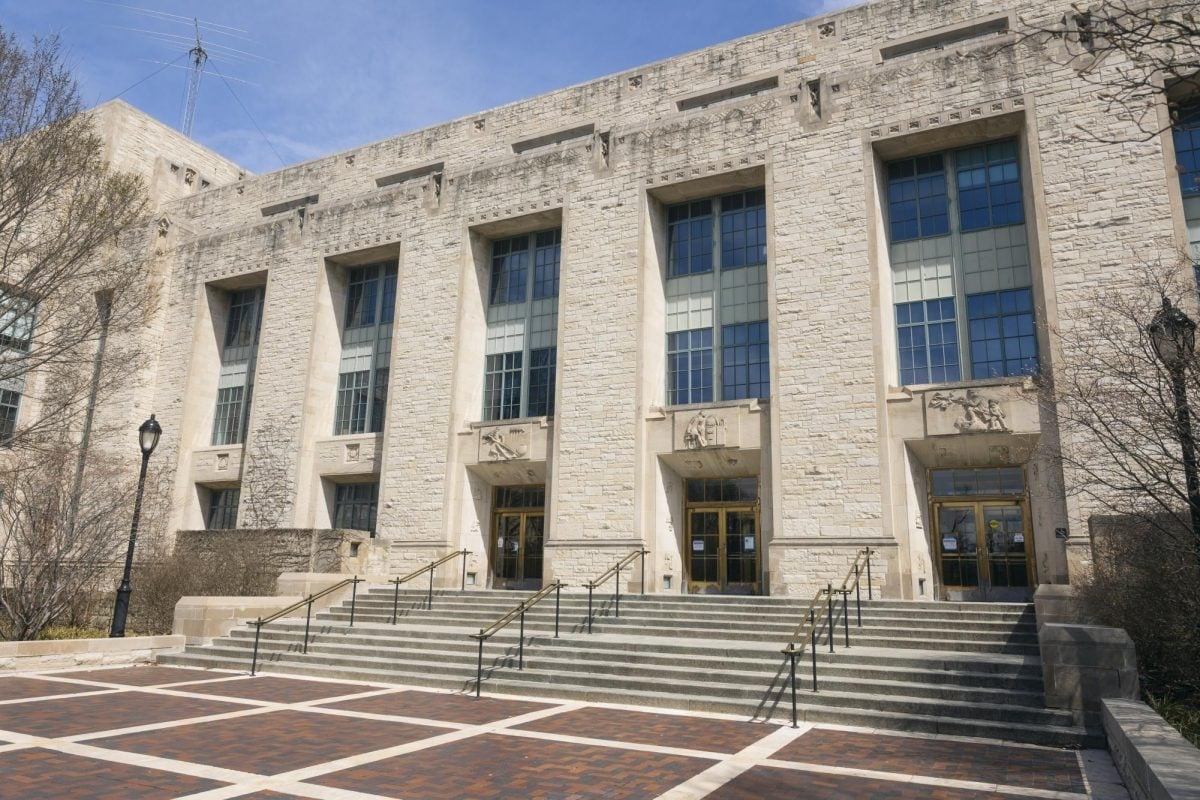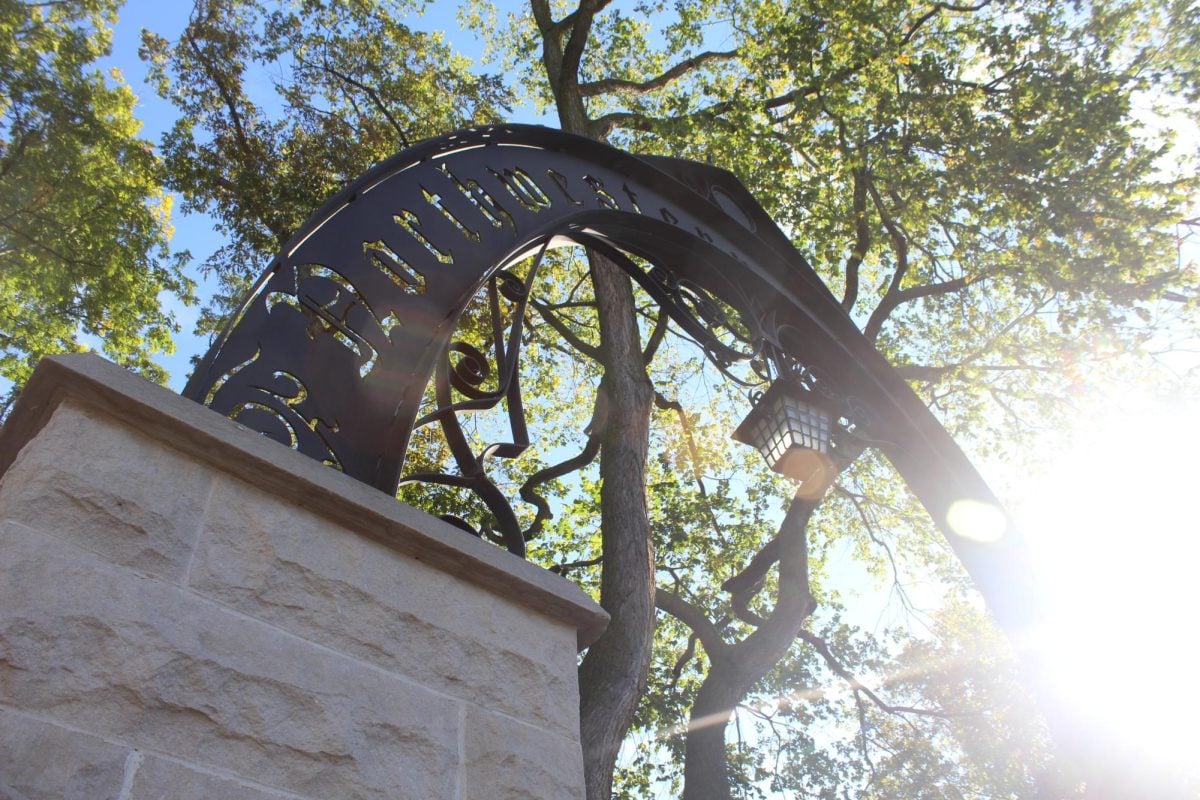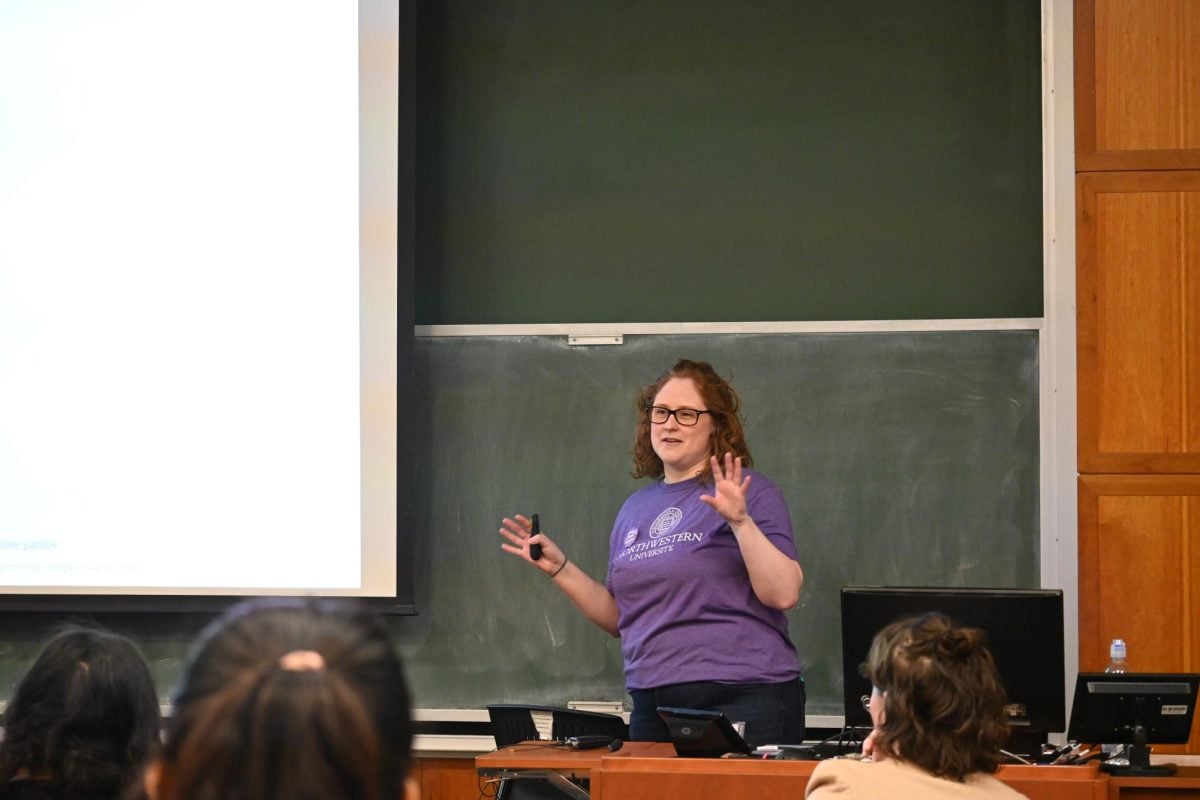This is part one of a two-part series about the history and future of the Medill Innocence Project. Read part two here.
Students in Northwestern’s most famous journalism class occasionally used questionably ethical reporting tactics while investigating potential wrongful conviction cases, according to multiple former students and other sources with knowledge of the Investigative Journalism course.
Among the questionable tactics, Medill Prof. David Protess encouraged his students to mislead interview subjects about their identities and intentions, party with potential sources, work closely with defense attorneys and attempt to convince eyewitnesses their original testimony may have been wrong, according to the sources.
In one 2009 incident, a student posed as a ComEd employee to obtain basic information about a witness. In a 2010 case, students used six similar-looking mug shots to suggest to a witness that his identification of a murderer may have been inaccurate.
“David’s just willing to push some boundaries,” said a former student, who requested anonymity to speak candidly about her experience. “I don’t think he crosses them outright, but I think he pushes them to the very edge.”
Despite the fame and prestige the Investigative Journalism class brought to NU, its reporting techniques have never been formally reviewed by administrators. Rumors about ethical violations have circulated but have never been publicly confirmed by those associated with the class.
Many of the sources spoke on the condition of anonymity due to the Medill Innocence Project’s ongoing legal battle and the general sensitivity of the situation. But all information included in this article was confirmed by at least two sources, including, in several cases, the students who used the tactics.
Protess, the founding director of the Medill Innocence Project and a well-known investigative reporter who has won dozens of awards for his work, acknowledged he advocated several of the tactics, but he insisted his students always acted in accordance with industry norms and in the tradition of award-winning investigative reporting that has positively influenced society.
Few, if any, of the incidents identified by critics involve blatant violations of the law or journalism ethics. Still, the tactics are controversial enough that knowledge of their use may raise questions about nearly 20 years of groundbreaking work. Reporting by Protess and his students, gathered during the Investigative Journalism class and then published or shared with attorneys in the legal case, has helped free 12 innocent men from prison, including five from death row, since the early ‘90s.
Those men’s guilt or innocence is unrelated to the reporting methods employed by a group of journalism students. But, if nothing else, the new information brings up questions about how best to teach investigative reporting at a journalism school, given the murky ethical nature of the craft.
Protess, a 29-year professor, is on leave after being barred from teaching his Investigative Journalism class this quarter and will not be teaching it next fall. The decision to remove him from teaching the class Spring Quarter was based on evidence the professor lied and doctored emails to avoid turning over documents to prosecutors who had accused Protess and his students of crossing ethical lines in investigating the murder conviction of Anthony McKinney. Protess claims his false statements were due to memory lapses and that he changed the emails to make them more accurate.
The professor switch had nothing to do with the reporting tactics Protess uses, University spokesman Al Cubbage said.
Few Medill professors realistically expect their colleague to ever return from his “leave of absence.” He’s currently focused on leading a newly launched independent nonprofit group, the Chicago Innocence Project.
It is unclear if the new professor, former investigative business reporter and best-selling author Alec Klein, will establish different ethical standards. Klein declined to comment for this story.
It is also unclear if the documents Protess sought to protect include any information about questionable reporting tactics. A spokeswoman for the Cook County State’s Attorney’s Office, which is currently reviewing the documents, declined to comment.
Investigative reporting experts noted their profession is fraught with ethical dilemmas. But many said some of the tactics used in Protess’s class seemed to cross the line.
“I don’t like any of them, and I wouldn’t use any of them, and while some of those tactics might get you to your goal more quickly, I don’t think any of them are necessary to accurately and fairly report on an innocence case,” said Mike McGraw, a longtime special projects reporter at the Kansas City Star who has worked on wrongful conviction stories in the past.
The vast majority of former students, on the other hand – even those involved in the controversial cases – strongly defended Protess and insisted they never did anything that even approached the limits of ethical behavior.
“My litmus test is always: If I even need to ask the question then it’s probably not right,” said Evan Benn (Medill ’04), who worked on the McKinney case and is now a reporter at the St. Louis Post-Dispatch. “And never did that litmus test fail in our reporting.”
The identity game
For students like Christine Wachter (Medill ’01), things are less black and white.
The former Investigative Journalism student said the class “raised a lot of ethical issues” for her and the other students investigating the 1997 “Girl X” rape case against Patrick Sykes. She pointed to the practice of “playing up” their status as “just students,” as opposed to professionals who can impact the legal process.
“I think people were a little more likely to talk to us because (we said), ‘Oh, we’re just some students working on a project for a class,'” said Wachter, a former Daily staffer, before adding “but that was 100 percent true.”
The ways in which students described their identities and their intentions to potential sources was the questionable reporting tactic most commonly mentioned by critics. In some cases, the violations were more severe than in Wachter’s example.
It was “routine” for students to misrepresent their identities to get basic information or during initial conversations with subjects, said a source familiar with the situation.
Over the past decade, students have pretended to be a ComEd employee, a U.S. Census worker and, most commonly, attorneys, multiple sources said.
It is standard industry practice for journalists to identify their occupation, employer and general subject of the story before interviewing potential sources. The Medill Integrity Code “requires” students “be honest” and “not misrepresent” themselves, Medill Dean John Lavine wrote in an email.
The Code of Ethics of the Society of Professional Journalists mandates that journalists “avoid undercover or other surreptitious methods of gathering information except when traditional open methods will not yield information vital to the public. Use of such methods should be explained as part of the story.”
Protess said he complies with the SPJ Code and adds the additional criteria of requiring his students to never break the law or directly lie to a source. He denied students have ever posed as attorneys, and he explained they posed as ComEd and Census workers because other methods had failed and student safety was a concern.
In the ComEd incident, Protess wrote in an email, the students “were drawing attention, and proclaiming they were Northwestern students might have put them in harm’s way. So, we discussed the Com Ed idea, purely as a way to LOCATE the witness on
a particular block. Obviously, the witness wasn’t interviewed by the student who posed as a Com Ed employee. Why would a utilities worker be asking her about a murder case?”
Other sources with knowledge of the incident offered a different perspective. They pointed out the students didn’t even attempt to talk to the witness before resorting to the ComEd disguise, questioning whether “all traditional open methods” had been exhausted, and they added there was no planned disclosure of the technique.
The sources also suggested some students attempted to get information from witnesses through a very different technique – by buying them beer and drinking with them at social events.
In one 2010 case, some students were particularly concerned by the partying, sources said. Protess said he is familiar with the incident but couldn’t comment because the facts are in dispute.
Many former students said “journalism of empathy” is an important part of the Investigative Journalism class. Sources are encouraged to “become part of” a source’s world “without judging them,” Protess wrote in an email.
“I have no problem with students grabbing a beer with sources. Mainstream journalists routinely buy drinks for sources,” he wrote. “Our policy on this issue is clear: We will reimburse students for one drink only. That’s because we want to be sure that the minds of both reporters and sources are clear.”
Journalists must be careful to maintain a professional relationship with sources, said Bob Steele, a professor of journalism ethics at Depauw University and the Nelson Poynter Scholar for Journalism Values at The Poynter Institute.
“The journalist has a reporting obligation that is built upon an appropriate distance from those the journalist covers,” said Steele, who specified he was not informed enough to speak specifically about NU’s Investigative Journalism class. “That distance has to do with the nature of connection and relationships.”
Another controversial technique students occasionally used to get information from potential sources was telling them they were working to free the innocent man whose conviction they were investigating, former students said. Posing the question in that way led friends of the convicted to consider how they might be able to help, the students said.
“You do sometimes say, ‘We’re here working for Aaron; we believe he’s innocent,’ and that’s a pretty gray area,” said Jennifer Merritt (Medill ’98), who worked on the Aaron Patterson case.
Protess said he discourages the tactic.
Medill Prof. Tim McNulty, a former public editor at the Chicago Tribune, said the ethics of a reporter bringing up motives depends in part on his or her intent.
“A journalist could just as bluntly say, ‘I’m working to win a Pulitzer Prize,'” said McNulty, stressing he was not speaking specifically about the Investigative Journalism class. “The question is: Are you trying to influence the answer?”
‘Defense investigators’?
Another question is to what extent the students actually were working to free innocent men.
Every student interviewed for this article emphasized that Protess repeatedly told them their goal was to find the truth, not to find evidence of innocence. But some students said behind that explicit statement, there were complications.
“The only reason you’re investigating the case is because of the possibility that this person may be innocent,” said Greg Lowe (Medill ’05), a former student who is now a grant writer for the nonprofit Summer Search. “There’s no story if they’re guilty. And I think that’s why people are passionate about it – you want to free someone from prison, you want to get someone off death row.”
But Lowe added that “at the same time, you’re dealing with the facts. You’re looking for the truth.”
Protess put it even more simply: “The evidence is the evidence; the facts are the facts,” he said.
Still, some former students pointed out that the Investigative Journalism class receives funding for its work from the Medill Innocence Project, a self-proclaimed advocacy organization. In addition, Protess provides the “heart and soul” of the class, as former student Diane Haag Libro (Medill ’00) put it, and he too is well-known as an advocate for reform of the criminal justice system.
Another potential issue, the critics said, is Protess’s practice of helping defense attorneys but not prosecutors. Multiple former students recalled “working closely” with defense attorneys throughout their investigation.
The class generally stops pursuing cases when conclusive evidence of guilt is uncovered. But in some cases when the facts were unclear or pointed toward innocence, evidence found to be detrimental to the convicted was withheld, the sources said.
“They were not journalists,” said a source familiar with the situation. “I submit to you, they were defense investigators.”
In the controversial and still-pending McKinney case, Protess acknowledged he provided evidence to the defense team that he did not give to prosecutors. But the professor said that was a “mistake” that was not representative of his “standard practice.”
“My connections to law enforcement are deep and long-standing,” he said. “Throughout my career, I’ve prided myself on sharing information with prosecutors, who aren’t happy initially, but get over it because they’re professionals.”
One book, six photos
The blurry line between reporter and “defense investigator” gets a little blurrier in cases in which students seemingly attempted to persuade witnesses their original testimony may have been wrong.
To do that, the students used the book “Picking Cotton.” The nonfiction novel, required class reading, tells the story of a rape victim whose false identification of her attacker led to an innocent man’s spending 11 years in prison. In recent years, Protess has encouraged students to give copies of the book to witnesses whose identification of a criminal helped lead to a conviction.
“It’s part of the technique to getting the witness to reconsider because witness misidentification is pretty common, if not rampant,” said Liana Balinsky-Baker (Medill ’10), who added she was comfortable with the strategy and strongly supported Protess.
Balinsky-Baker, a former Daily staffer, said her teammates also employed another tactic to open the minds of witnesses: showing them an “array” of six black-and-white mug shots – the potentially wrongfully convicted man and five other men carefully chosen for their similar looks to the convicted.
The students then asked the witness to identify the killer. When he chose the wrong person, they informed him of his mistake. The students planned to interview the witness later to see if he would recant his testimony.
“It sounds a little sketchy, but it wasn’t a big deal,” Balinsky-Baker said.
One of her teammates, Corinne Lestch (Medill ’10), a former Daily staffer, agreed, saying she had “no reservations” about using the photos.
“Investigative reporting exposes hidden truths,” Protess wrote in an email. “To achieve that goal, it often is necessary to challenge a source’s recollection of events.”
McGraw, the Kansas City Star reporter, has a different view.
“That sounds like a trick to me,” said McGraw, who won the 2009 Investigative Reporters and Editors investigative reporting award for a series on human trafficking. “It sounds like the kind of trick the police use to get the convictions in the first place. If we stoop to the same tactics that the police use to get wrongful convictions, then we’re no better than they are, even if we get innocent people out of prison.”
Do the ends justify the means?
McGraw’s point gets at a central question in the ethics debate: Do the ends justify the means? Given that most of the controversial tactics are only in the “gray area” and lead to the freeing of innocent people from prison,
is their use acceptable and even positive?
According to former students and other sources, the class is driven by the idea that the ends do justify the means.
“That’s always been sort of the way David operated,” one former student said.
But Protess denied the description.
“As a general rule, freeing the innocent doesn’t justify reporting methods that would violate the SPJ Code,” he wrote in an email. “In my class, we discuss this issue on a case by case basis. Ethical journalism involves reflection and debate, even if you don’t arrive at an answer that everyone agrees with.”
In the end, Protess said, the decision is up to the students.
“As long as I’ve been here, David’s strategy has always been that the cases belong to the students. They make the decisions on the case,” said Rebekah Wanger (Weinberg ‘97), the former program assistant of the Medill Innocence Project. “If a student can’t have the risk of making a mistake in an educational setting where they can learn from it, where are they going to have that?”
Protess only steps in when there’s danger to students, he said. That’s what occurred in a southern Illinois forest preserve in May 2004, when students recorded a source without consent – usually a crime in Illinois. The students wore the wire so teaching assistant Sergio Serritella could hear the conversation and intervene if the situation became dangerous, Protess said. Prosecutors have latched onto that incident – along with allegations that students paid witnesses and flirted with witnesses – to argue that Investigative Journalism students crossed ethical lines.
Serritella declined to comment for this story.
Paul Ciolino, a former private investigator for the Investigative Journalism class, said Protess should not be held responsible for the actions of each of his students.
Ciolino added that any questionable reporting tactics employed by Protess and his students pale in comparison to the habitual misconduct of police and prosecutors.
“The bad behavior on the other side so outweighs anything that Dave does,” Ciolino said. “I mean, they’re killing people. They are knowingly killing people that they know are innocent.”
Years from now, Ciolino said, Protess will be a “beloved figure,” and few will care about the tactics that were used to free innocent people.
Former students voiced similar feelings.
Jesse Abrams-Morley (Medill ’05) said there’s a “danger in encouraging people” to not “be aggressive” in looking for the truth. Abrams-Morley, a former Daily staffer who took the class in 2004-05 and is now clerking for a federal judge in Philadelphia, added he hopes the public remembers the positive work the Investigative Journalism class has done.
“Whatever David was doing, and whatever was happening in the class,” he said, “whether or not there have been some things that were wrong, there was a whole lot done that was right, and it’s really, really important as this goes forward that people not lose sight of that.”







